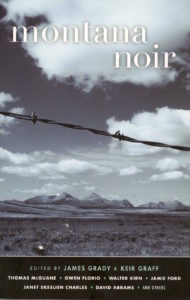
Editing Montana Noir “has been a wonderful way to return to our home state, with everything that’s good and bad about it,” say editors James Grady and Keir Graff (who also contributed stories to this darkly stellar collection).
Actually, with the exception of a few tales (Walter Kirn’s creepy “Oasis” for one), it’s not as dark as I anticipated. Maybe the editors’ definition is more apt: “Noir is struggle. It’s doing the wrong thing for the right reasons. It’s being trapped. It’s hubris …” All themes that shade the stories of 14 Montana authors.
Not only does Montana Noir offer snippets by an illustrious crew – David Abrahms, Jamie Ford, Gwen Florio, Walter Kirn, and Thomas McGuane among them – it also takes readers on a rocky, reeling road trip across our big state.
Speed across the Hi Line with a boozy crew of strippers in Grady’s “The Road You Take”; keep company with a thieving Doberman and an ex-trapeze artist at an abandoned military installation near Glasgow in “All the Damn Stars in the Sky”; visit a small farming town rocked by an unsolved murder in Janet Skeslien Charles’s “Fireweed”; and head to Glendive, where a boxer gets revenge on her diabolical stepfather in Jamie Ford’s “The Dive.”
In “Red, White, And Butte” by David Abrams, a cynical Iraq veteran returns to his hometown in hopes of snagging a fallen hero’s wife: “My job, if I could get it, was Widow Comforter.” A mediocre writing student executes a perfect murder in Gwen Florio’s “Trailer Trash.” In Tom McGuane’s story, “Motherlode,” a young man with a promising career in artificial insemination gets drawn into a murky drug-running scheme on the edge of the Bakken oil fields.
And in two stories, Indians finally find some justice: The grandfather of Nina Three Dresses takes care of a bad cop who’s harassing her in Debra Magpie Earling’s “Custer’s Last Stand.” And the great-grandson of an Indian scout uses legal maneuvers to curb a modern-day stalker in Sidner Larson’s “Dark Monument.”
Along the way, these well-told tales offer an engrossing snapshot of Montana’s fabled literary landscape. Every one, a worthy read.
– Kristi Niemeyer